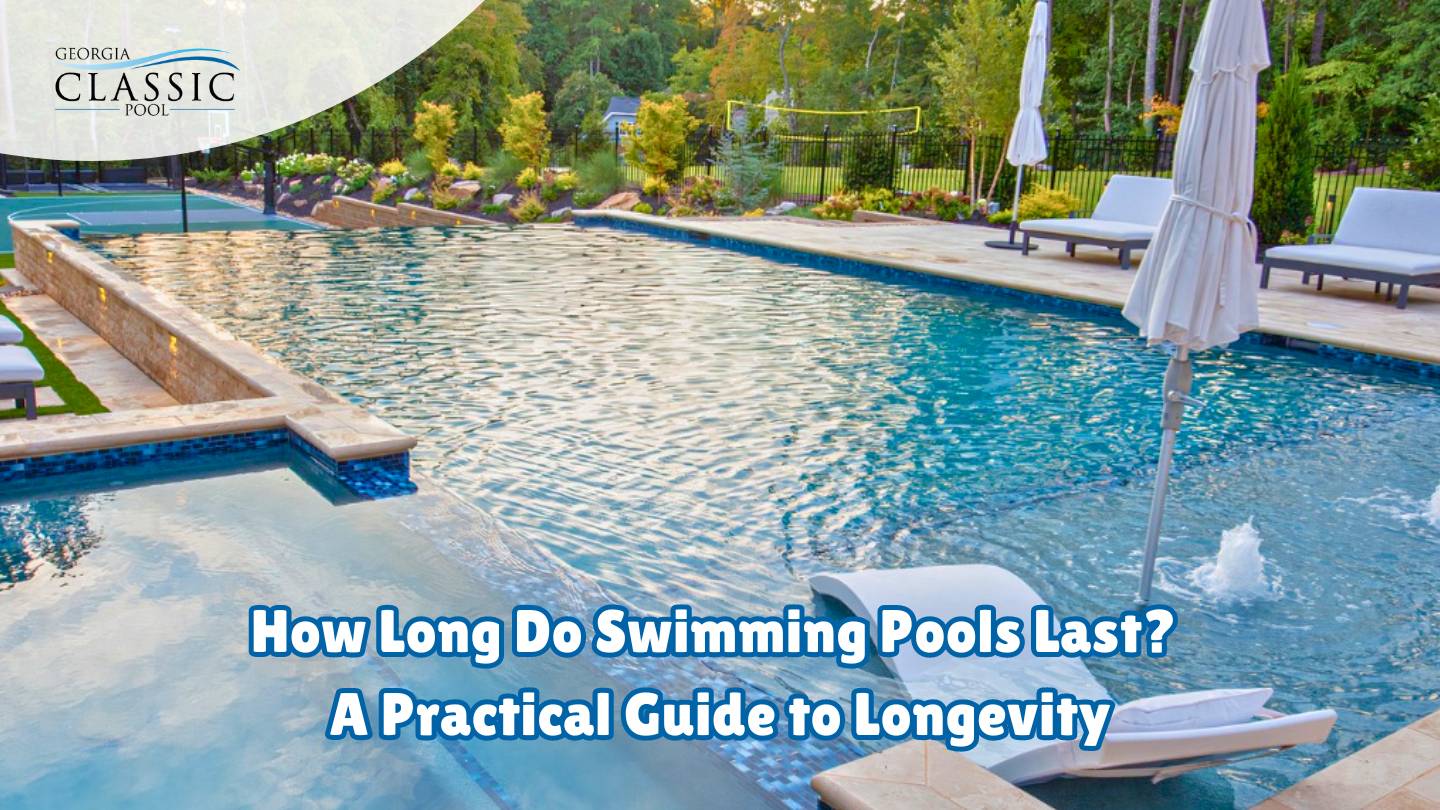Wondering how long do swimming pools last? The lifespan of your pool depends on the type: vinyl liner pools can last 8 to 15 years, fiberglass pools around 30 years, and concrete pools over 50 years. Factors like maintenance, installation quality, and environmental conditions also play a crucial role. In this article, we’ll explore the longevity of different pool types, what affects their lifespan, and how to keep your pool in top condition.
Key Takeaways
- Different types of swimming pools have varying lifespans, with vinyl liner pools lasting 6 to 15 years, fiberglass pools over 30 years, and concrete pools exceeding 50 years with proper maintenance.
- Pool longevity is influenced by factors such as the quality of installation, regular maintenance, and environmental conditions, all of which are crucial for preventing extensive damage and costly repairs.
- To extend the life of a pool, homeowners should focus on regular maintenance, professional inspections, proper winterization, and upgrading worn components, ensuring long-term enjoyment and efficiency.
Lifespan of Different Types of Swimming Pools
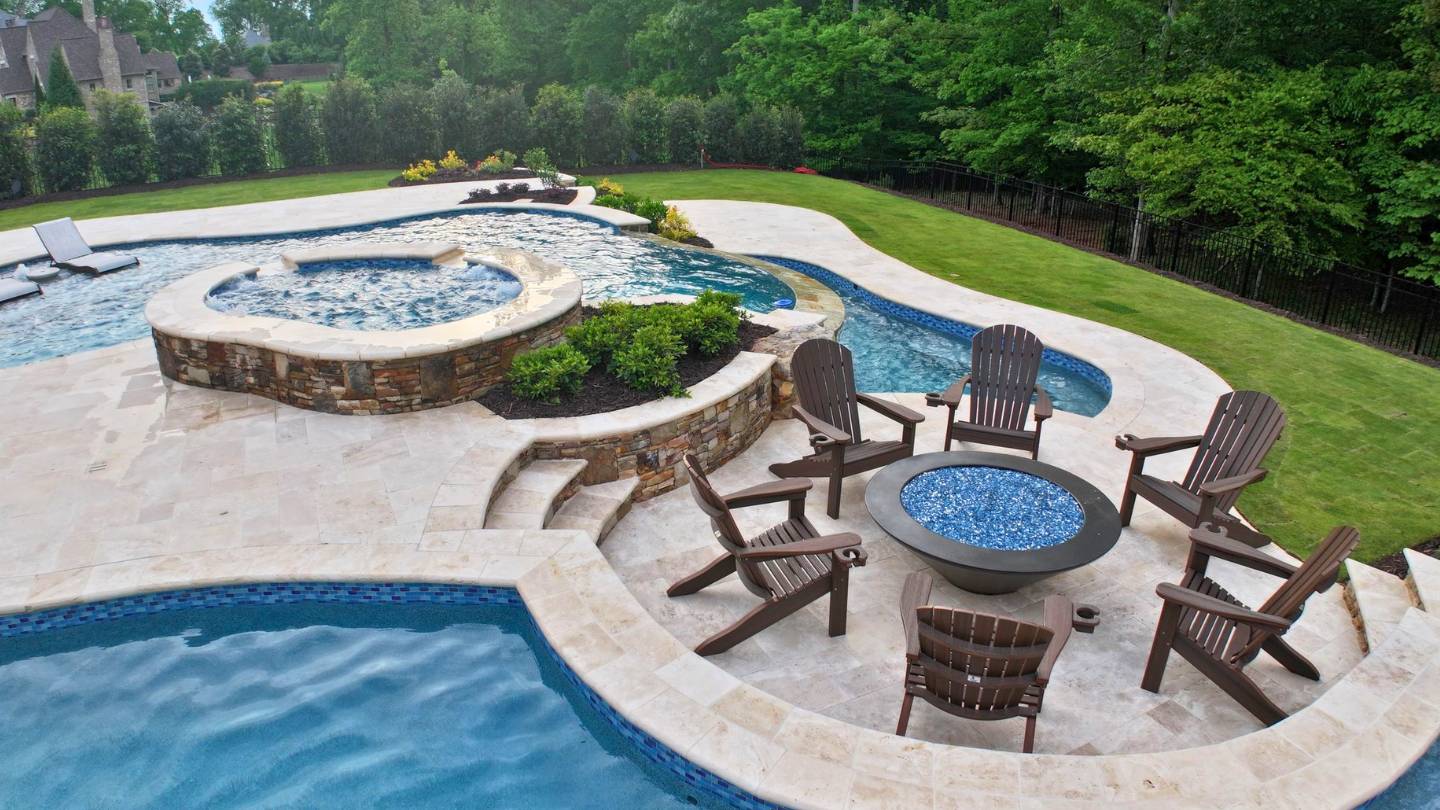
Each type of pool, be it a vinyl liner, fiberglass, or concrete pool, boasts distinct characteristics regarding longevity and upkeep requirements. Gunite pools, a type of concrete pool, are highly durable and customizable, with a potential longevity of over 100 years when properly installed. When contemplating the purchase of a pool, it is vital to grasp not only the average lifespan, but also the elements that can affect its durability. The lifespan of an inground pool varies significantly depending on the materials used, such as concrete, vinyl, and fiberglass.
Delving into the details pertinent to every kind of pool will assist you in making a well-considered decision.
Vinyl Liner Pools
Above ground pools and in-ground pools with vinyl liners are favored for their cost-effectiveness and adaptability. Typically, the lifespan of a vinyl pool liner is between 6 to 12 years. With diligent maintenance, in-ground pools outfitted with a vinyl pool liner can extend their life expectancy to somewhere between 8 and 15 years. It’s usually necessary to replace these vinyl liners every decade or so (10-12 years) to maintain peak performance levels. Above ground versions exhibit similar longevity timelines – the liner often requires replacement after about half a dozen to a dozen years (6-12), while the physical structure of these above ground setups may remain intact from roughly eight up until fifteen years under optimal conditions.
Proper maintenance plays an essential role in prolonging any pool’s usefulness, especially those equipped with a vinyl liner. Such care involves routine cleaning tasks coupled with precise chemical management as well as prompt repair work upon spotting any rips or punctures within the material—all critical factors that when ignored could accelerate deterioration leading to diminished service time from your swimming facility. Securing top-notch quality when selecting your pool’s vinyl liner paired consistently adhered-to upkeep practices stands out as crucial strategies destined not only for expanding its operational tenure but also assuring sustained efficient functioning throughout its usable lifetime.
Fiberglass Pools
Fiberglass pools are renowned for their robustness and minimal upkeep. These types of pools are designed to endure for at least 30 years, benefiting from a non-porous fiberglass material that minimizes the likelihood of cracking and other forms of structural damage. Although it’s possible for fiberglass pool surfaces to develop separations due to fluctuations in temperature over time, these cannot be simply patched up. Maintenance demands remain relatively low. A gel coat might only need reapplication once every 15 years if deemed necessary.
The extended lifespan offered by fiberglass pools renders them an attractive choice for homeowners who value long-term solutions. The smooth surface inherent to these pools impedes algae accumulation, which translates into less frequent cleaning requirements and reduces the necessity for chemical treatments as well. With considerate care and negligible ongoing maintenance needs, a fiberglass pool stands as not only a source of continuous pleasure but also enhances the visual charm of any property it graces.
Concrete Pools
Gunite pools, a specific type of concrete pool, are celebrated for their durability, often exceeding a 50-year lifespan when properly maintained. To preserve both the structural integrity and aesthetics of a gunite pool, it’s typically necessary to undergo resurfacing every decade or so. The life expectancy of these pools is subject to various elements including how well they’re installed, local environmental conditions, and how frequently they’re utilized.
While gunite pools do require periodic upkeep in terms of resurfacing, they provide unparalleled strength as well as customizable features. They can be tailored to any desired shape or size, which makes them an adaptable option for homeowners seeking a distinctive and durable swimming area. Consistent cleaning along with maintaining proper chemical levels is crucial in sustaining the condition of a gunite pool over many years.
Factors Affecting Pool Longevity
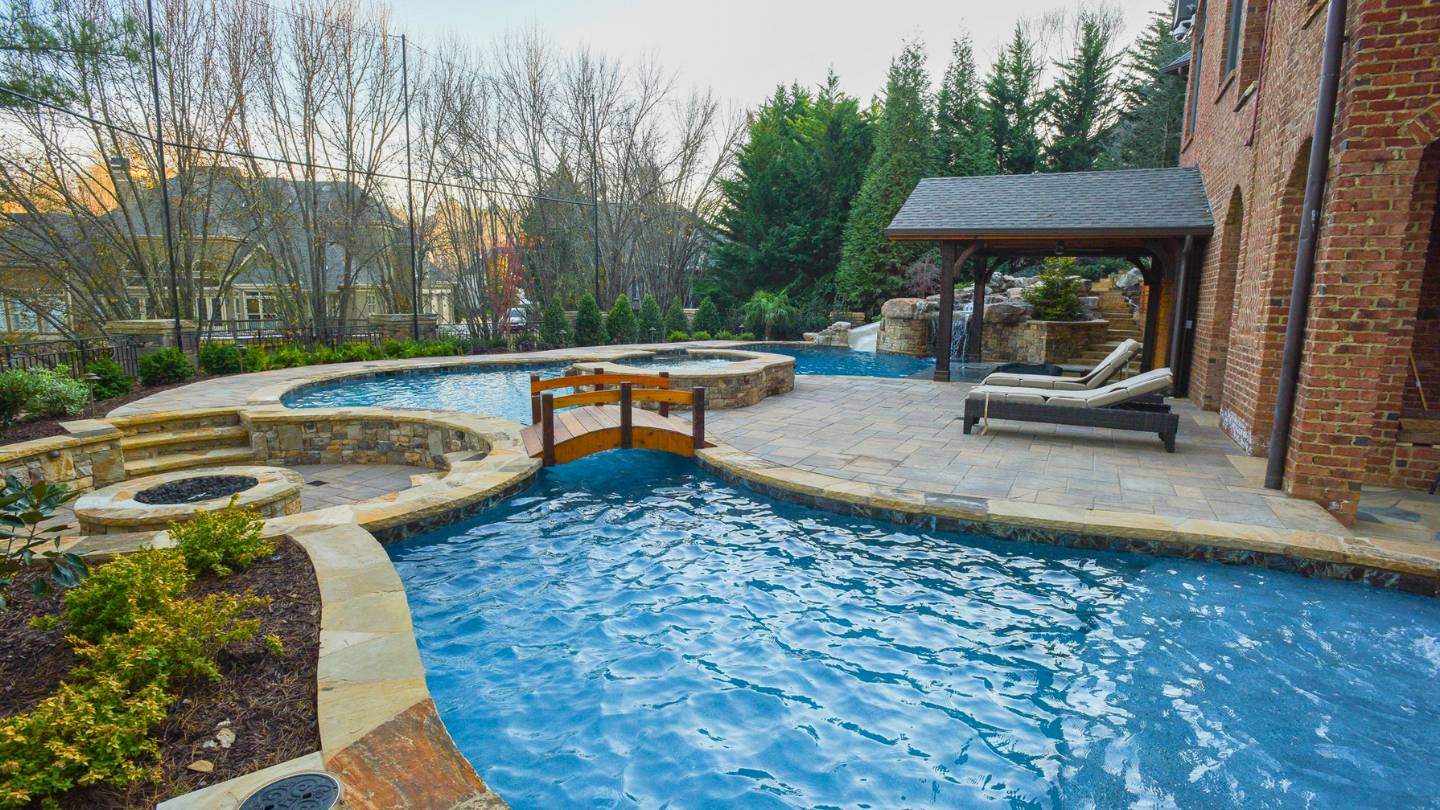
The durability of a swimming pool isn’t just influenced by its design. Various additional elements are crucial in determining how long the pool will endure. The way the pool is installed, consistent maintenance, and the surrounding environment can all drastically affect the lifespan of a swimming pool.
Understanding these factors is essential for ensuring that you undertake appropriate measures to maintain your swimming in optimal condition over an extended period.
Quality of Installation
Ensuring that your pool is properly installed by seasoned professionals is critical for its quality and durability. Expertly navigating the complexities of construction, experienced installers mitigate potential future issues, thus promoting long-term enjoyment. Selecting accomplished pool builders with specific proficiency in Atlanta ensures superior construction and choices designed for enduring satisfaction.
On the flip side, improper installation can precipitate a plethora of problems ranging from structural impairments to suboptimal operation. By employing top-notch materials and proven techniques, adept installers are key to constructing a resilient pool. Investing upfront in premium installation services reaps benefits over time by curtailing the necessity for extensive repairs and enhancing the overall longevity of your pool.
Regular Maintenance
Routine upkeep is essential for prolonging the lifespan of a pool properly. Ensuring that pH levels and other chemical balances are correctly maintained is critical to prevent damage to the pool’s surface and avoid various issues. Engaging in standard maintenance activities, such as thorough cleaning, monitoring chemical balance, and appropriate winterization techniques, is key to averting severe problems while maintaining prime conditions.
Maintaining consistent care through periodic inspections and routine cleanings helps prevent expensive repairs while preserving the quality of your pool. Regular maintenance practices contribute significantly to extending the life of your swimming facility by providing a safe and pleasurable experience for swimmers.
Neglecting these crucial maintenance tasks can lead to considerable degradation over time, curtailing the functional life expectancy of your pool and ultimately to heightened costs associated with intensive maintenance efforts required due to corrosion.
Environmental Conditions
The durability of swimming pools is significantly influenced by the local environment. Pool surfaces are particularly susceptible to deterioration from extreme weather conditions such as strong sunlight and heavy precipitation. How well different materials withstand these elements varies, influencing both their maintenance requirements and lifespan. Vinyl liners, for example, may become brittle or discolored when exposed to harsh sun rays. In contrast, concrete pools might experience surface roughness or cracking during freeze-thaw cycles.
To prevent enduring damage to pools due to climatic variations, consistent inspection and upkeep are essential. Taking a preventive approach and dealing with issues related to weather swiftly can help lengthen your pool’s usable life while helping you circumvent extensive repair costs down the line.
Understanding how your specific regional climate affects your pool is crucial for implementing appropriate protective actions tailored to prolonging its condition over time.
Signs Your Pool Needs Repairs or Replacement
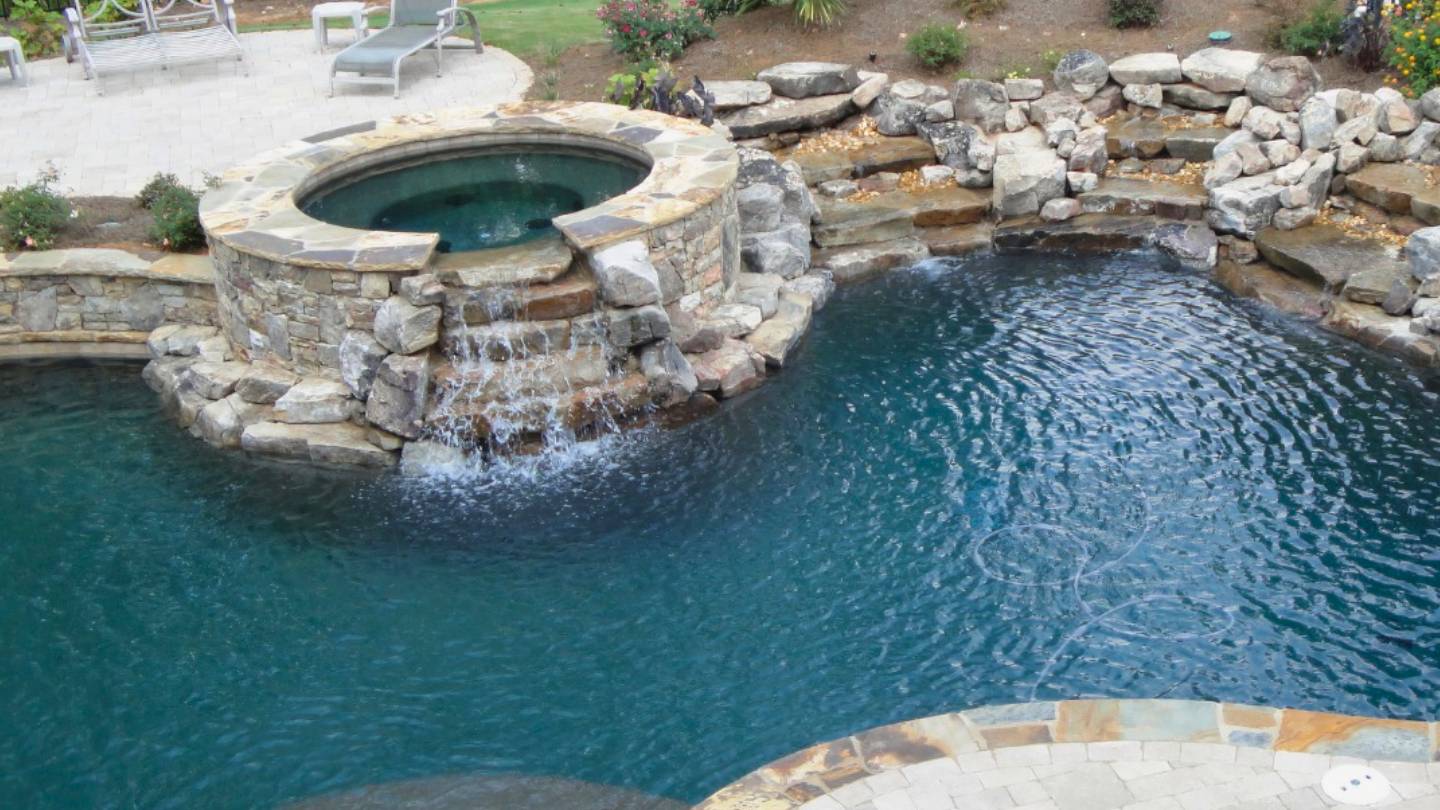
Identifying early signals that your pool requires repair or replacement can prevent severe damage and escalating expenses down the line. Essential signs to look out for are structural integrity compromise, malfunctioning equipment, and ongoing issues with water quality. By detecting these indicators swiftly, you can take immediate action to maintain your pool in prime condition.
Structural Damage
In the case of pool damage, one might encounter a variety of issues including tears or holes in liners, rust on the framework, wall fissures, and water leakage. Indicators of structural problems with concrete pools may comprise changes in coloration, stains appearing on surfaces as well as cracks and surface coarseness. Addressing such concerns swiftly is crucial for averting deterioration and safeguarding the longevity of your pool.
When dealing with an above ground pool, smaller damages like insignificant tears or areas affected by rust can frequently be remedied without needing to replace parts entirely. This remains an effective solution when damage is limited. On the contrary, it’s vital to quickly repair any fractures observed in concrete pools since neglecting them could provoke larger rifts and escalated structural complications.
Ensuring that you conduct regular checks and promptly carry out repairs is key to preserving your pool’s overall integrity.
Equipment Failure
If your pool is exhibiting signs of equipment failure, it’s a clear indication that it requires immediate attention. Pumps that aren’t functioning correctly can result in poor filtration, which compromises the water’s purity and directly impacts the longevity of your swimming pool. The importance of key components like pumps, filters, and heaters cannot be understated as they are essential to maintaining an optimal environment within the pool. If these elements fail, they could drastically reduce its lifespan.
Ignoring issues with malfunctioning pool equipment can escalate into major damage that may necessitate expensive repairs or even compel you to replace entire systems. To avoid such outcomes, promptly addressing any concerns with your pool’s apparatus is vital for preserving a well-functioning and enduring swimming area. Engaging in regular maintenance alongside swift repairs when needed will help guarantee efficient operation of the swimming facility while maintaining its prime condition over time.
Water Quality Issues
Ongoing issues with water quality may be symptomatic of deeper structural or functional problems within a swimming pool. For instance, cracks in concrete pools, the presence of rust on metal frame pools, or tears and leaks in vinyl liners can all point to structural concerns that affect the quality of water. Equipment failures such as malfunctioning pumps, filters, or heating systems are also potential culprits for compromised water quality.
Maintaining regular cleaning routines and ensuring chemical levels remain balanced is critical to stave off problems with water quality. Neglecting these persistent signs can escalate into more severe complications requiring extensive repairs or even necessitating a total replacement of your pool.
Prioritizing the maintenance of pristine water conditions plays an integral role in safeguarding both the health and longevity of your swimming pool.
Extending the Life of Your Pool
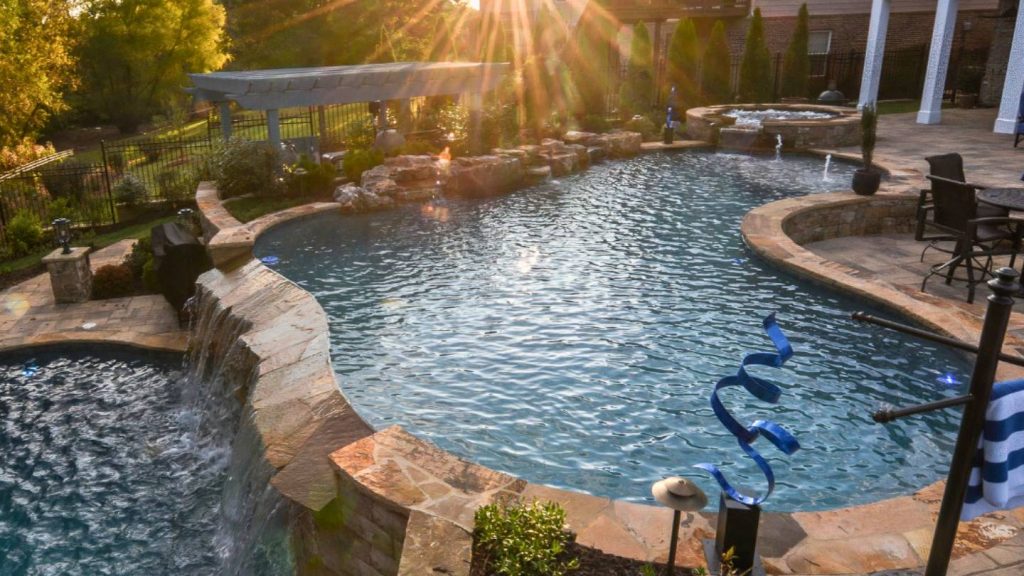
By engaging in consistent maintenance, arranging for professional inspections, adequately winterizing, and updating components when necessary, you are taking vital steps to prolong the life of your pool. These measures will not only maximize its lifespan, but also maintain its status as a cherished and delightful feature of your residence over an extended period.
Professional Inspections
Maintaining the integrity of your swimming pool requires consistent professional evaluations. Specialists from ASP in your vicinity can offer assistance and expert guidance for pool maintenance, which includes early identification of possible complications. It is recommended to engage in habitual cleaning, brushing off debris, and eliminating chemical residues specifically for maintaining a concrete pool.
Ensuring that proper maintenance procedures are straightforward stems from professional installation. Routine inspections conducted by experts can pinpoint problems at an early stage, thus averting expensive fixes and prolonging the life span of your concrete swimming pool.
Commitment to securing professional maintenance services guarantees that your swimming pool stays in prime condition while functioning effectively.
Proper Winterization
Ensuring your pool is properly winterized can shield it from the harsh conditions of colder weather. Implementing sound winterization practices safeguards against the detrimental effects freezing temperatures might have on both the surfaces and machinery within your pool. It’s crucial to maintain an appropriate chemical equilibrium throughout the winter season in order to keep those pool surfaces protected.
By executing a meticulous approach to prepare your pool for the cold, you help maintain its pristine state which helps dodge extensive repairs when temperatures rise again. This involves reducing water levels as needed, securely covering up the pool, and administering necessary winter chemicals to preserve water quality.
Adhering strictly to thorough winterization routines greatly contributes towards prolonging not just the functionality but also enhances the longevity of life for your swimming haven.
Upgrading Components
To extend the usability of a swimming pool, it is crucial to renovate aging or deteriorated parts. The liner and filter system are among components that might require upgrading. By installing contemporary, more effective filtration systems, both water clarity is improved and pressure on the swimming pool’s framework is diminished.
Enhancing your pool with updated elements boosts not just its functionality but also its longevity. Committing to better quality and robust materials guarantees consistent operation of your swimming pool while keeping it in prime shape over time.
Consistently evaluating and enhancing the components associated with your pool will safeguard its condition as well as enhance its lifespan.
Choosing the Right Pool for Longevity
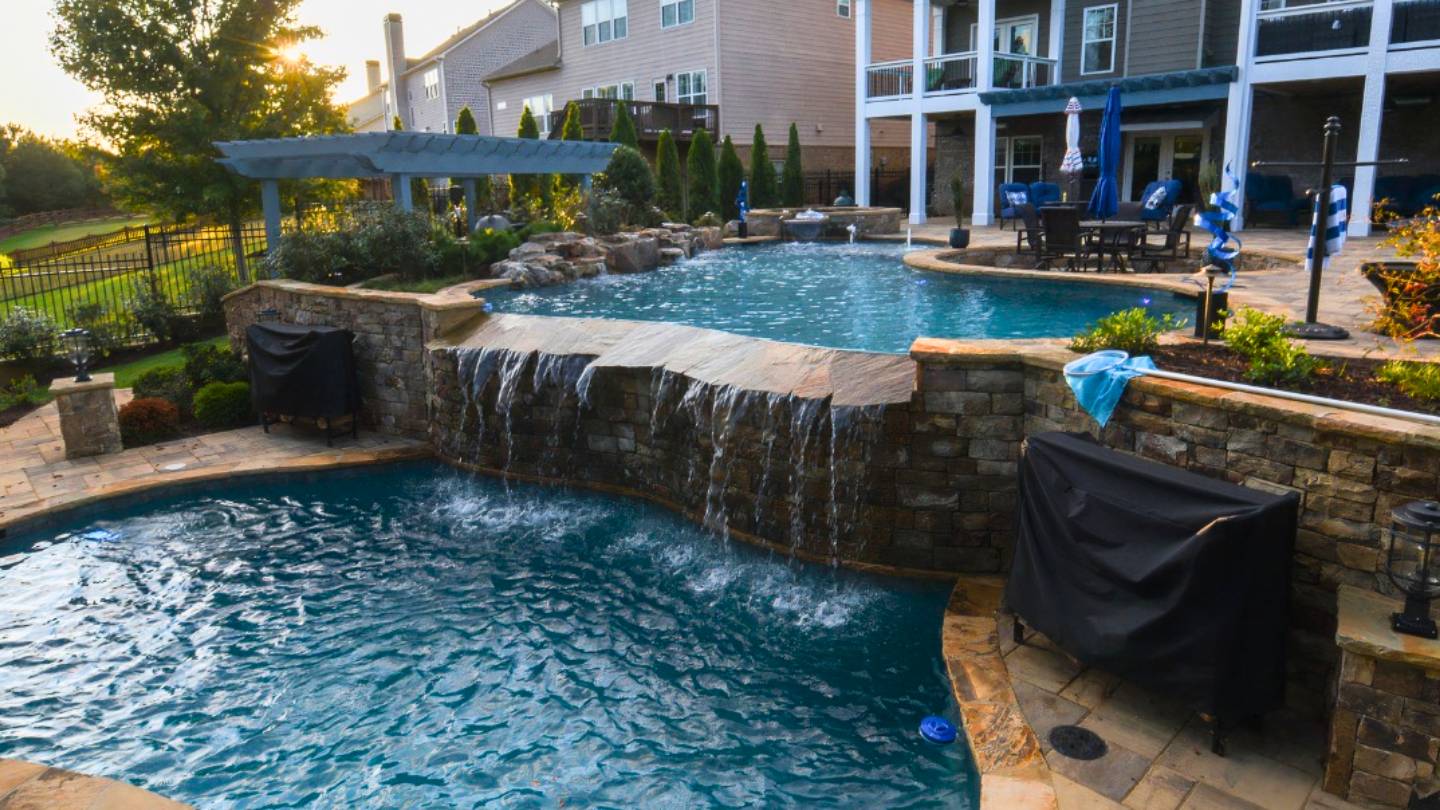
To ensure the longevity of a pool, it’s crucial to take into account not only the type of pool, but also the initial investment costs and ongoing maintenance requirements. Seeking professional advice can contribute to making choices that will keep your pool as an enduring valuable asset. In-ground pools last significantly longer than above-ground pools due to their durable construction and proper maintenance.
Starting with well-considered decisions is key in maintaining a pool that will continue to be beneficial for numerous years ahead.
Comparing Costs and Benefits
When selecting a pool, it’s essential to weigh the initial costs against the long-term benefits of each type. Pools with a vinyl liner present an economically attractive option at first due to their lower upfront price. They tend to accrue greater expenses over time owing to the need for frequent liner replacements approximately every 7-15 years. Despite being kinder on your budget initially, pools made from vinyl have a shorter lifespan of about 10-15 years before requiring significant repairs or full replacement.
Alternatively, pools constructed from fiberglass come with a higher initial investment but are accompanied by advantages such as reduced maintenance requirements and extended durability when compared with vinyl-liner pools. Fiberglass pools rarely require resurfacing or new liners, which contributes significantly towards lowered ongoing costs and makes them more cost-effective over time. For homeowners who value longevity alongside ease of upkeep, investing in fiberglass pools can provide better value because these typically incur fewer long-term expenses while ensuring lasting quality and serviceability.
Expert Consultation
It is essential to seek advice from seasoned professionals when choosing the appropriate pool, which will lead to enduring contentment. A skilled and trustworthy installer can offer valuable insights into the most suitable materials for constructing an in-ground pool. These specialists are equipped to outline the advantages and disadvantages of various pool types, taking into account factors such as local weather conditions, intended use, and your financial plan.
Engaging experienced Atlanta pool constructors guarantees a tailored design that aligns with personal requirements. Professional guidance assists in selecting optimal features and materials that contribute to extending the life of the pool. With their knowledge at your disposal, you can make well-informed choices, ensuring a sturdy, easy-to-maintain ground pool that also satisfies aesthetic preferences.
Summary
To sum up, grasping the longevity of various swimming pool types—vinyl liner pools, fiberglass pools, and concrete pools—and understanding what influences their durability is vital for making educated choices. Each type demands distinct regular maintenance routines to maximize its lifespan. Ensuring that your pool receives quality installation and taking into account environmental factors play a significant role in enhancing the life of your pool. Acknowledging when repairs are needed, securing expert evaluations, and replacing parts as necessary can extend the period of utility for your pool. By selecting an appropriate pool and committing to meticulous upkeep, you’ll be able to enjoy this cherished home addition for an extended time frame.
For residents of Atlanta and the surrounding regions, Georgia Classic Pool offers exceptional pool construction and maintenance services. Their expertise and commitment to quality ensure the creation of a durable and stunning pool tailored to your needs.
Frequently Asked Questions
How long do vinyl liner pools typically last?
Vinyl liner pools typically last between 6 to 12 years, while in-ground vinyl pools can last 8 to 15 years with proper maintenance.
Regular care is essential to maximize their lifespan.
What is the average lifespan of a fiberglass pool?
Fiberglass pools generally have an average lifespan of 30 years or more due to their durable and non-porous nature. Investing in a fiberglass pool can provide long-term enjoyment and reliability.
How often do concrete pools need resurfacing?
Concrete pools typically need resurfacing every 10 to 15 years to ensure their lasting structure and appearance.
Regular maintenance within this timeframe will help preserve the pool’s integrity.
What are the benefits of regular professional inspections for my pool?
By routinely having experts inspect your pool, you can considerably prolong its longevity. These inspections help pinpoint and rectify problems before they escalate, which can save you a substantial amount of money in potential repair expenses.
Making these professional assessments a priority will not only keep your pool in top condition, but also guarantee that it remains a secure and pleasurable amenity for the foreseeable future.
Why is proper winterization important for my pool?
Proper winterization is essential to protect your pool from potential damage caused by freezing temperatures, which can harm pool surfaces and equipment.
Taking the time to winterize ensures your investment remains safe and functional for the next season.

